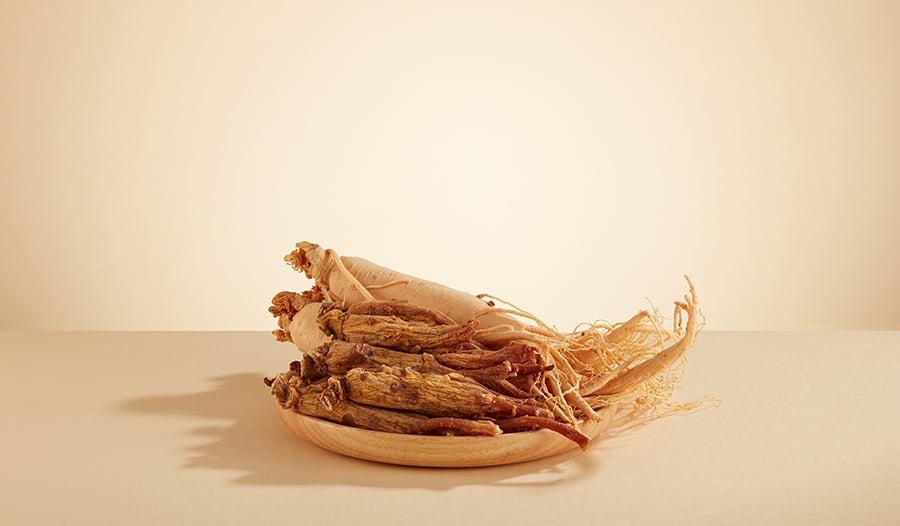Hvorfor vi elsker ginseng: Sundhedsmæssige fordele, forskellige typer og bivirkninger

Ginseng har en lang historie som urtemedicin og er nu et almindeligt buzzword, der fremmer ikke kun drikkevarer, men sundheds- og energiprodukter af alle slags. Det er kendt for at understøtte energi, reducere træningsevne, fremme årvåd og hjælpe med at håndtere stress.
Traditionelt brugt som en generel tonic til at understøtte trivsel, når kroppens systemer er svækket, kan ginseng inkluderes som en del af den omfattende behandling af mange lidelser.
Ginseng er en adaptogen
Urter som ginseng, der understøtter en sund stressreaktion kaldet adaptogener. Adaptogener hjælper dig med at opretholde sunde niveauer af cortisol (stresshormonet), have mere energi, have bedre kognitiv funktion og sove bedre under stressende omstændigheder. De anses traditionelt for at være dybt nærende for hele kroppen.
Der findes mange forskellige ginseng-præparater og -typer, hvilket fører til vanskeligheder med konsekvent at fortolke den videnskabelige litteratur og historiske anvendelser. Nogle kulturer bruger forskellige dele af maden, tilbereder dem som te eller spiser dem hele; eller har andre behandlingsteknikker. Både kvaliteten af botaniske produkter og studiedesign varierer drastisk; der findes stadig meget information. Tal med din kvalificerede sundhedsudbyder om at tage ginsengstilskud eller andre lægemidler. Resultaterne er bedst, når de bruges over en længere periode.
Ginseng er så populær, at ordet bruges om flere forskellige planter, der ikke er helt ens; dog er de i samme plantefamilie, Araliaceae. Ginsenger er også værdsat, fordi de vokser meget langsomt og er vanskelige at dyrke, hvilket fører til, at de bliver overhøstet i naturen og dyre at dyrke i drivhuse eller gårde.
Amerikansk ginseng (Panax quinquefolius)
Den mest traditionelle anvendelse af amerikansk ginseng er hjemmehørende i det østlige Nordamerika for at lindre udmattelse fra overarbejde; tørhed i mund, øjne og hud; og svag fordøjelse. Amerikansk ginseng har en kølig kvalitet, hvilket er godt for folk, der har tendens til at føle sig varme.
Panax quinquefolius har god forskning i dets anvendelse til blodsukkerregulering. En undersøgelse fra 2019 viste, at tilføjelsen af amerikansk ginseng sammen med konventionel behandling af type 2-diabetes var sikker og effektiv til forbedring af blodsukkerkontrollen. Tal med din læge om at tilføje dette til din diabetesbehandlingsplan.
Derudover har amerikansk ginseng vist sig i mus at være effektiv til både behandling og forebyggelse af colitis. Det er antiinflammatorisk og antioxidant for fordøjelseskanalen. Mere forskning er nødvendig for at se, om dette resultat er konsistent i menneskelige befolkninger.
Asiatisk ginseng (Panax ginseng)
Panax ginseng, også kendt som rød, hvid, kinesisk eller koreansk ginseng, bruges mest traditionelt til udmatning, hvilket fører til kortisoldysregulering og ustabilitet i blodsukkeret. Asiatisk ginseng har en opvarmningskvalitet, hvilket betyder, at det måske ikke er bedst at bruge i varmt vejr eller hos mennesker, hvis kropstemperaturen har tendens til at løbe varm.
Panax ginseng har betydelig forskning af forskellig kvalitet om dets anvendelse til at hjælpe med at styre blodsukkeret. Hvis du kæmper med lavt eller højt blodsukker, kan Panax ginseng hjælpe din blodsukkerstabilitet. Tal med din læge om at bruge noget til at hjælpe med blodsukkerregulering, især hvis du har diabetes eller andre problemer med blodsukkerdysregulering.
Der findes mere forskning, der tyder på, at Panax ginseng kan være nyttigt til immunsystemstøtte, forbedring af kognitionen, øget fysisk udholdenhed, anti-aging, opretholdelse af sunde kolesterolniveauer, forskellige lidelser i det kardiovaskulære og åndedrætssystem, depression, angst og menopausale symptomer.
Sibirisk ginseng (Acanthopanax senticosus)
For nylig omklassificeret fra Eleutherococcus senticosus og kendt som Eleuthero, blev denne plante ikke traditionelt kaldt ginseng. Navnet er for nylig blevet brugt til markedsføringsformål; Eleuthero er dog en del af den samme plantefamilie. Det bruges mest til genopretning fra langvarig stress, bedring efter operation eller sygdom og forbedret atletisk præstation.
Eleuthero er nyttigt til udholdenhed, herunder atletisk præstation, og for koffeinlignende årvåge, så det kan være nyttigt for folk, der ikke tåler kaffe godt, men gerne vil have et energiboost.
En undersøgelse af unge mandlige atleter viste, at Eleuthero taget i otte uger signifikant forbedrer kardiovaskulær funktion, fysisk ydeevne og stofskifte. En anden undersøgelse hos mus viste, at genopretning efter fysisk anstrengelse blev forkortet med tilskud fra Eleuthero.
In vitro undersøgelser har vist, at Eleuthero kan hæmme RNA-viral replikation og også kan være nyttigt til at forkorte variationen af akutte sygdomme, såsom forkølelse og influenza.
Undersøgelser er blevet udført for at undersøge brugen af Eleuthero til behandling af mavesår, gigt og autoimmun sygdom og som et generelt antiinflammatorisk middel med langvarige resultater. Der er dog behov for mere forskning for at bekræfte disse anvendelser.
Ashwaghanda (Withania somifera)
Ashwaghanda, eller Withania somnifera, kaldes undertiden indisk ginseng, fordi det har mange lignende anvendelser som adaptogen, selvom det ikke er botanisk relateret til ægte ginseng. Det er en del af familien Solanaceae eller natskygge.
Ashwaghanda bruges traditionelt til at give næring til hele kroppen, især i tider med kronisk stress eller bedring. I modsætning til ægte ginseng er det ikke stimulerende, men kan faktisk hjælpe folk med at sove bedre, og det kan ske senere om aftenen. Det bruges oftest som adaptogen eller i autoimmune sygdomme.
En systematisk gennemgang af randomiserede kliniske forsøg fra 2013 med ginseng til forskellige menopausale symptomer fandt ingen afgørende tegn på effektiviteten. Undersøgelser, der brugte ginseng, blev imidlertid inkluderet i denne gennemgang, hvilket førte til uoverensstemmelser i potentielle doser, præparater, plantedele og specifikke planter. En anden systematisk gennemgang af randomiserede placebokontrollerede forsøg afsluttet i 2022 viste, at de omfattede undersøgelser, som også omfattede brug af enhver form for ginseng, viste forbedrede hedeture, menopausale symptomer og generel livskvalitet hos menopausale kvinder. Mere interesse for plantemedicin vil forbedre kvaliteten af undersøgelser og information.
Bivirkninger
Ægte ginsengs mest almindelige bivirkninger er søvnbesvær eller følelse af overstimulering og rastløshed. Ginseng kan også påvirke blodtryk, puls og menstruation, og de kan forårsage hovedpine og fordøjelsesforstyrrelser. Ginseng er kendt for at interagere med nogle lægemidler, især statiner, blodfortyndere, blodtryk og blodsukkermedicin. Fortæl din læge om eventuelle kosttilskud, du tager.
Takeaway
En del af det botaniske navn, Panax, er afledt af ordet panacea, hvilket betyder, at ginseng kan bruges som behandling af mange forskellige lidelser i alle kropssystemer. Det er en stærk, vigtig gruppe af planter med en lang, traditionel brugshistorie for mange lidelser. Videnskabelige undersøgelser, der giver os mere tillid til at bruge ginseng som urtemedicin, udføres fortsat. Tal med din kvalificerede sundhedsudbyder om at tilføje ginseng til dit daglige regime for generel velvære.
Referencer:
- Asiatisk ginseng. Nationalt Center for Komplementær og Integrativ Sundhed. Udgået 2. oktober 2022. https://www.nccih.nih.gov/health/asian-ginseng
- de Oliveira Zanuso B, de Oliveira Dos Santos AR, Miola VFB, Guissoni Campos LM, CSG Spille, Barbalho SM. Panax ginseng og aldringsrelaterede lidelser: En systematisk gennemgang. Ekspr. Gerontol. 2022; 161:111731. doi: 10.1016/j.exger.2022.111731
- Chen W, Balan P, Popovich GD. Gennemgang af ginseng anti-diabetiske undersøgelser. Molecules. 2019; 24 (24): 4501. Udgivet 9. december 2019 doi: 10.3390/molecules24244501
- Glatthaar-Saalmüller B, Sacher F, Esperester A. Antiviral aktivitet af et ekstrakt afledt af rødbeder af Eleutherococcus senticosus. Antiviral Res. 2001; 50 (3) :223-228. doi: 10.1016/s0166-3542 (01) 00143-7
- Kim MS, Lim HJ, Yang HJ, Lee MS, Shin BC, Ernst E. Ginseng til håndtering af symptomer på overgangsalderen: en systematisk gennemgang af randomiserede kliniske forsøg. J Ginseng Res. 2013; 37 (1): 30-36. doi: 10.5142/jgr.2013.37.30
- Kuo J, Chen KW, Cheng IS, Tsai PH, Lu YJ, Lee NY. Effekt af otte ugers tilskud med Eleutherococcus senticosus på udholdelsesevne og stofskifte hos mennesker. Chin J Physiol. 2010; 53 (2): 105-111. doi: 10.4077/cjp.2010.amk018
- Lee HW, L., Lee MS. Brug af ginseng til menopausale kvinders sundhedspleje: en systematisk gennemgang af randomiserede placebokontrollerede forsøg. Komplement Ther Clin Pract. 2022; 48:101615. doi: 10.1016/j.ctcp.2022.101615
- Li T, Ferns K, Yan ZQ, et al. Acanthopanax senticosus: fotokemi og anticancerpotentiale. Jeg er J Chin Med. 2016; 44 (8): 1543-1558. doi: 10.1142/S0192415X16500865
- Shergis JL, Zhang AL, Zhou W, Xue CC. Panax ginseng i randomiserede kontrollerede forsøg: en systematisk gennemgang. Phytother Res. 2013; 27 (7): 949-965. doi: 10.1002/ptr.4832
- Sumiyoshi M, Kimura Y. Effekt af Eleutherococcus senticosus cortex på genopretning fra den tvungne svømmetest og fedtsyre β-oxidation i leveren og skeletmuskulaturen hos mus. Nat Prod J. 2016; 6 (1) :49-55. doi: 10.2174/2210315506999151207145020
- Szczuka D, Nowak A, Zaklos-Szyda M, et al. Amerikansk ginseng (Panax quinquefolium L.) som kilde til bioaktive fytokemikalier med sundhedsfremmende egenskaber. Ingredienser. 2019; 11 (5): 1041. Udgivet 9. maj 2019 doi: 10.3390/nu11051041
- Tilgner S. Urtemedicin: Fra Jordens Hjerte. Creswell, OR: Wise Acres; 2009.
- Vuksan V, Xu ZZ, Jovanovski E, et al. Effekt og sikkerhed af amerikansk ginseng (Panax quinquefolius L.) ekstrakt på glykæmisk kontrol og kardiovaskulære risikofaktorer hos personer med type 2-diabetes: et dobbeltblindt, randomiseret, cross-over klinisk forsøg. Eur J November 2019; 58 (3): 1237-1245. doi: 10.1007/s00394-018-1642-0
- Wood M. The Earthwise Herbal, en komplet guide til medicinske planter i den gamle verden. Berkley, Californien: Nordatlantiske bøger; 2008.
- Wood M. The Earthwise Herbal: En komplet guide til lægeplanter i den nye verden. Berkeley, CA: Nordatlantiske bøger; 2009.
ANSVARSFRASKRIVELSE: Wellness Hub har ikke til hensigt at stille diagnoser...

















































































 Indholdsfortegnelse
Indholdsfortegnelse















